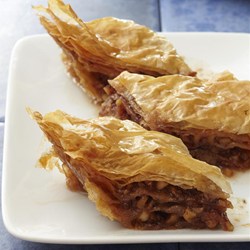The Baklava Ritual
15 Nov, 16
When you’re craving a sweet treat, sometimes slicing up a tube of cookie dough and baking it for ten minutes will do the trick. After all, there’s nothing wrong with a little instant gratification. But in this season of ritual and tradition, taking the time to create a more complex confection can provide a welcome moment of contemplation amid a hectic schedule. Baklava, with its many layers of phyllo dough and nut filling soaked in spiced honey syrup, is just such a dessert. And with a name that means “many leaves” in Farsi, it’s especially fitting for fall!
Baklava originated in the Middle East and Europe, and Americans are most familiar with its Turkish and Greek varieties. Buttery and packed with nuts, this decadent dessert can often satisfy a sweet tooth with just a couple of bites. Phyllo dough is buttered and placed sheet by sheet on a pan, adding a layer of nut filling—most commonly chopped walnuts or pistachios mixed with sugar, cinnamon and cloves—in the center portion. Immediately after baking, a syrup of honey or sugar, water, spices, and lemon juice is poured over the top to absorb as the dough cools.
The trickiest part of making baklava is managing the phyllo dough. Frozen dough will break, so the night before baking, remove your box from the freezer and place it in the refrigerator. When you’re ready to start assembling, place the dough between two damp (not wet) towels. This will keep it pliant and easy to pull up in sheets. Make sure to use a sharp knife to trim the dough to fit your pan and slice the stack into triangles before and after baking.
Making baklava is an excellent family activity, as people can take turns layering dough, chopping nuts, and stirring the honey syrup. It’s also perfect as a solitary, meditative activity. As each layer of buttery dough goes into the pan, let a layer of stress pull away. You’ll have to be patient—after baking, the dessert must soak up the syrup for at least a few hours—but the reward you’ll reap from the end product will be well worth the wait. 
